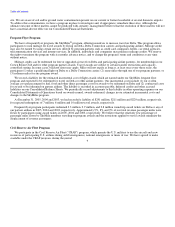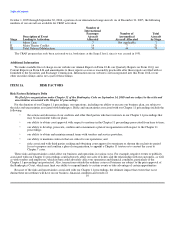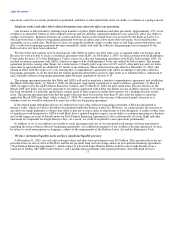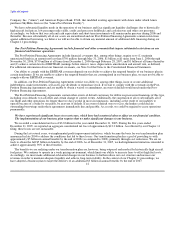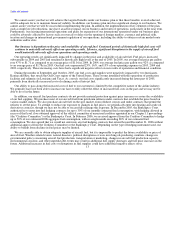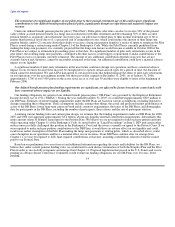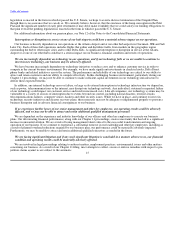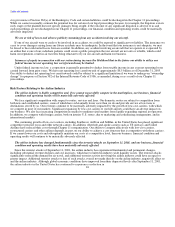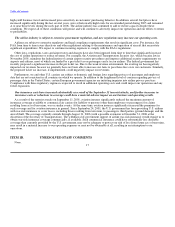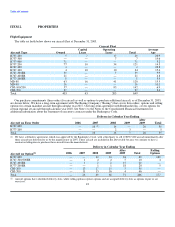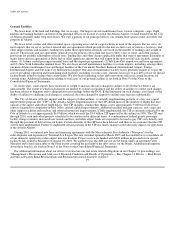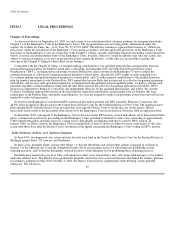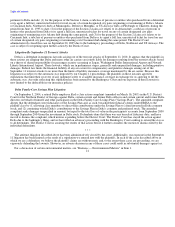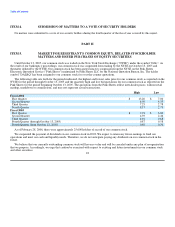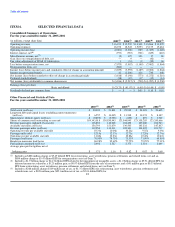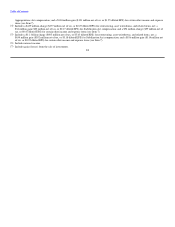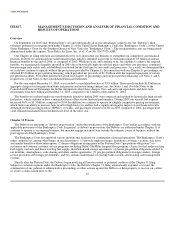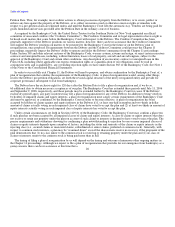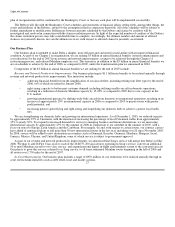Delta Airlines 2005 Annual Report Download - page 22
Download and view the complete annual report
Please find page 22 of the 2005 Delta Airlines annual report below. You can navigate through the pages in the report by either clicking on the pages listed below, or by using the keyword search tool below to find specific information within the annual report.
Table of Contents
high-yield business travel and increased price sensitivity in customers' purchasing behavior. In addition, aircraft fuel prices have
increased significantly during the last several years, were at historically high levels for an extended period during 2005 and remained
at or near those levels during the early part of 2006. The airline industry has continued to add or restore capacity despite these
conditions. We expect all of these conditions will persist and will continue to adversely impact our operations and our efforts to return
to profitability.
The airline industry is subject to extensive government regulation, and new regulations may increase our operating costs.
Airlines are subject to extensive regulatory and legal compliance requirements that result in significant costs. For instance, the
FAA from time to time issues directives and other regulations relating to the maintenance and operation of aircraft that necessitate
significant expenditures. We expect to continue incurring expenses to comply with the FAA's regulations.
Other laws, regulations, taxes and airport rates and charges have also been imposed from time to time that significantly increase
the cost of airline operations or reduce revenues. For example, the Aviation and Transportation Security Act, which became law in
November 2001, mandates the federalization of certain airport security procedures and imposes additional security requirements on
airports and airlines, most of which are funded by a per ticket tax on passengers and a tax on airlines. The federal government has
recently proposed a significant increase in the per ticket tax. Due to the weak revenue environment, the existing tax has negatively
impacted our revenues because we generally have not been able to increase our fares to pass these fees on to our customers. Similarly,
the proposed ticket tax increase, if implemented, could negatively impact our revenues.
Furthermore, we and other U.S. carriers are subject to domestic and foreign laws regarding privacy of passenger and employee
data that are not consistent in all countries in which we operate. In addition to the heightened level of concern regarding privacy of
passenger data in the United States, certain European government agencies are initiating inquiries into airline privacy practices.
Compliance with these regulatory regimes is expected to result in additional operating costs and could impact our operations and any
future expansion.
Our insurance costs have increased substantially as a result of the September 11 terrorist attacks, and further increases in
insurance costs or reductions in coverage could have a material adverse impact on our business and operating results.
As a result of the terrorist attacks on September 11, 2001, aviation insurers significantly reduced the maximum amount of
insurance coverage available to commercial air carriers for liability to persons (other than employees or passengers) for claims
resulting from acts of terrorism, war or similar events. At the same time, aviation insurers significantly increased the premiums for
such coverage and for aviation insurance in general. Since September 24, 2001, the U.S. government has been providing U.S. airlines
with war-risk insurance to cover losses, including those resulting from terrorism, to passengers, third parties (ground damage) and the
aircraft hull. The coverage currently extends through August 31, 2006 (with a possible extension to December 31, 2006 at the
discretion of the Secretary of Transportation). The withdrawal of government support of airline war-risk insurance would require us to
obtain war-risk insurance coverage commercially, if available. Such commercial insurance could have substantially less desirable
coverage than currently provided by the U.S. government, may not be adequate to protect our risk of loss from future acts of terrorism,
may result in a material increase to our operating expenses or may not be obtainable at all, resulting in an interruption to our
operations.
ITEM 1B. UNRESOLVED STAFF COMMENTS
None. 17




